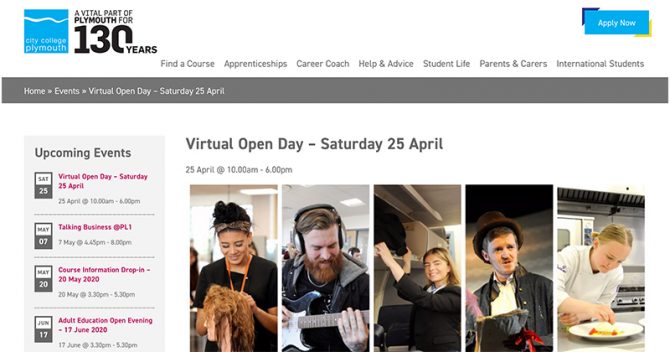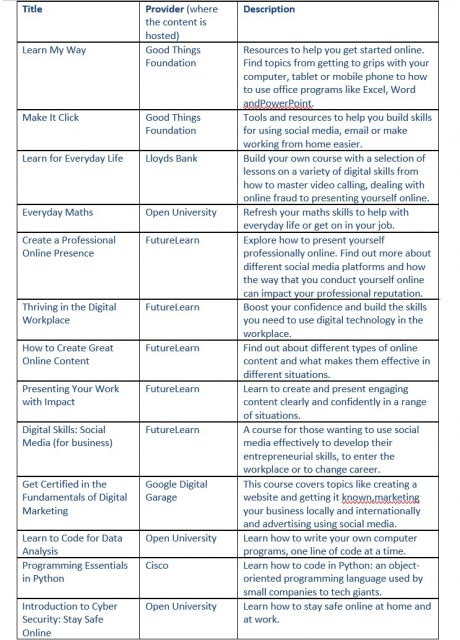FE Week spoke to a handful of colleges that have cancelled their traditional summer open days and already started to advertise an online alternative
’Tis the season for the traditional college open day, a chance for prospective students to visit campuses, chat with lecturers and ultimately choose their place of study for the next academic year.
But the unprecedented nationwide lockdown because of the Covid-19 outbreak has seen nearly all open days postponed until further notice.
Colleges have, as a result, got creative to ensure these vital events go ahead in some form or other.
Software and social media, such as Zoom, Facebook and Microsoft Teams, are all being utilised to conduct the open days virtually.
Live video tours of campuses, one-to-one chats via messengers with lecturers, and telephone enrolments are all replacing physical visits.
City College Plymouth told FE Week it has opted for the Zoom video platform to host around 150 students aged 15 to 18 in real-time on April 25, from 10am to 5.15pm.

Head of marketing Louise Greenleaf said even though their campus is closed for visitors due to the lockdown, “we know that this is still a critical time for year 11s and their parents to consider post-16 options, so it’s crucial that we enable them to find out about the courses on offer and check out our facilities”.
Those who sign up will be able to choose from ten 30-minute sessions tailored for a range of courses, including apprenticeships, from hair and beauty to construction.
Once they choose a session they will be met with a two-minute intro from the session’s “host” – a member of staff working in that area – who will talk through the college’s key stats.
A 15-minute faculty talk will follow, which will be conducted while a member of the marketing team tours around campus to show the facilities on another livestream viewed on the same Zoom window.
Relevant employers, including representatives from engineering firms, the local police and NHS Trust, will then give a three-minute talk before finishing with a ten-minute Q&A.
Around 60 staff will be “speakers” throughout the event.
Meanwhile, at South Devon College during the week commencing May 4, 16 webinars will be broadcast using the Microsoft Teams platform, which students can join securely via a link and use to ask questions live.
The individual 30-minute sessions, each led by two members of curriculum staff, will include all the different subject areas available, how to apply for a course, finance, travel and learning support that is on offer.
They will all be recorded and available to watch back on the college website for students who can’t tune in at the time.
Laurence Frewin, principal of South Devon College, told FE Week that the webinar experience will involve “course-specific information talked through by our experienced and knowledgeable tutors”.
“This will include some visual elements – images and videos – to give participants an idea of the college campus and facilities as well as what college life is like, while they are unable to visit in person,” he explained.
“Our Helpzone Team will then cover some of the important questions asked at our open days, including what support is available for students both with their learning, their finances and their pastoral care.”
Prospective students taking part in the sessions at City College Plymouth and South Devon College will be given the option of signing up to a course on the day via phone, or given the details of their admissions teams to contact at a later date.
Bath College is set to hold its first virtual open day on May 14, and will use bespoke software currently being created by its developers on its website.
Students who sign up will be invited to click on a link that logs them on to the system, where they can listen to a choice of seven pre-recorded webinars and talks, based on topics that include welfare, apprenticeships and higher education and are each around three to four minutes long.
Students can alternatively go to live webchats with the lecturing team for a specific course to ask questions.
Jon Domaille, assistant principal for learner journey and customer relations at Bath College, described open events as “massively critical” and said it is “really vital” to keep them going in some form during lockdown.
“It is an incredibly uncertain time for students at the moment, so this is about us being able to show them that no matter what is happening, we are there for them,” he told FE Week.
“Primarily, over the past few weeks everyone has been using technology to work, speak to family and friends, so from our perspective why shouldn’t technology be used to connect and inspire prospective students?
“They need to build up a picture as to what the subjects are about, what the environment is and who they potentially will be working with. A web or paper prospectus wouldn’t do that alone.”
While the college is embarking into “unknown territory”, if the May 14 virtual open event proves a success, it could be something that the college runs even when it goes back to work properly.

East Riding College has opted to make use of Facebook as the home of its online open events and is hosting a number this month and in June, each lasting around three hours.
Students will be able to take virtual tours of the campus, view 360-degree photos of the teaching rooms, workshops and other facilities and watch video messages from key staff.
In addition, tutors will be online to answer any questions via the social network’s messenger service.
Neil Waterhouse, executive director for commercial and finance at East Riding College, explained: “Often the most useful part of their visit is getting the chance to speak to teaching staff on a one-to-one basis, and that opportunity can be provided online instead of face to face.
“In place of campus tours, visitors can take virtual tours of parts of the campus, and view 360-degree photos of the facilities. The team are also on hand to answer queries about other support available, such as free bus travel and student finance.”
Just like at a real-life event, the marketing team will be on hand to direct “visitors” to the right member of staff.
Sunderland College, Northumberland College and Hartlepool Sixth Form, which together form the Education Partnership North East (NPNE), are offering similar virtual open days to East Riding, but they will direct prospective students to a dedicated page on their website that will offer live chats, instead of using Facebook.
They also include 360-degree video tours of campuses, while those interested in securing their place on the day will be able to do so instantly via an application fast-track service.
Staff will ring visitors if they would prefer to speak over the phone.
Ellen Thinnesen, chief executive of NPNE, said the events are aimed to “enable prospective students to engage with the college when a physical event was not possible”.
“The marketing team operate a live chat ‘switchboard’ to manage and transfer chats to key curriculum areas and specialist support staff,” she explained.
“Curriculum staff are available throughout the event to log into Live Chat and pick up transferred chats from marketing.”
Thinnesen told FE Week the first took place at Northumberland College on March 31, where almost 250 students participated, followed by one at Hartlepool Sixth Form on April 2, which generated 81 visitors.





